

our maine home – zone 5b


Yesterday, from the hoophouse.
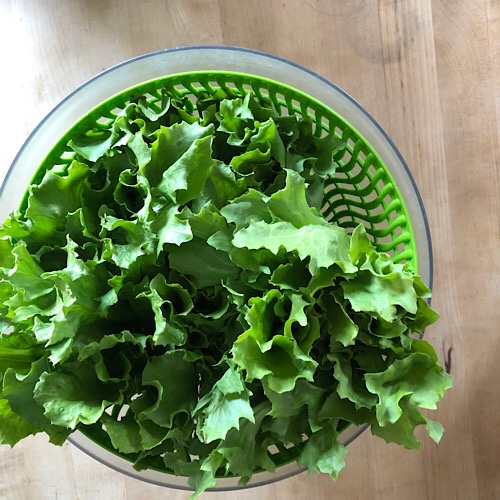
I’m happy with this year’s overwintered greens. Clockwise from lower left: Bloomsdale spinach, escarole, arugula, baby kale. And plenty of self-seeded claytonia.
We’ve been eating homegrown greens for a few weeks now. It’s amazing that they survive the cold winter nights (under row cover).
I planted these in mid-September. This year, the electric fence did its job and kept out voles.

Some photos from yesterday morning and then from yesterday’s snowshoe excursion on the Woods Trail starting behind the house.






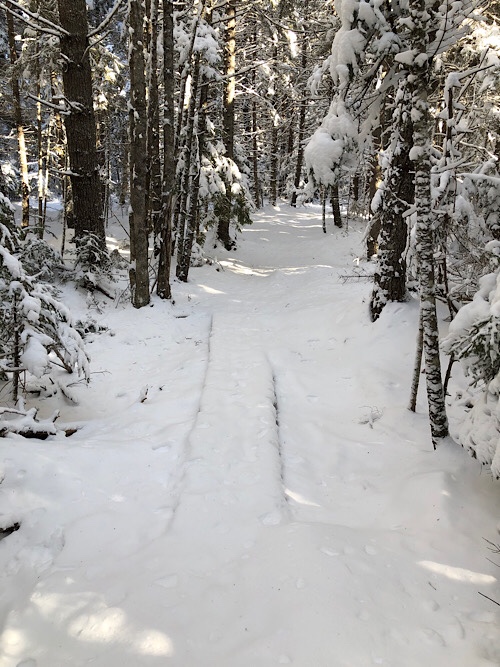
The weather warmed up and it wasn’t raining, yet. So Sam and I spur-of-the-moment decided to dig up the rest of the potatoes. It was an adventure. Exciting to find these big tubers glowing in the partly frozen ground under mounds of hay mulch. The varieties are Katahdin (white), Adirondack Blue and Adirondack Red. Maybe next season, less colors and more white. There’s something unnerving about finding red and blue colors in your food.
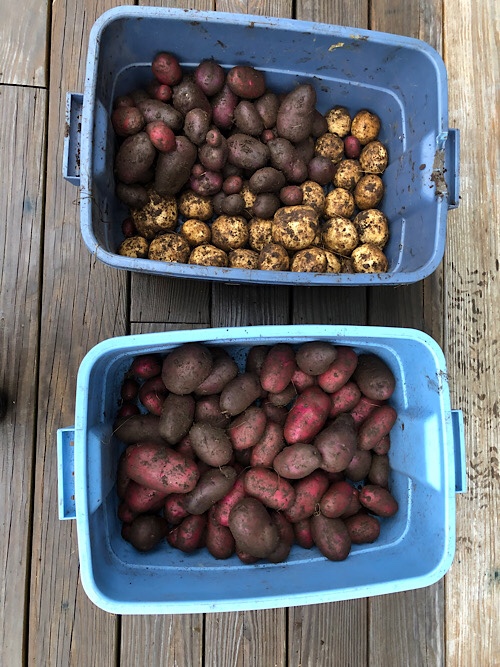
These are now drying on a table inside under cardboard. Then they will go into cold storage in the pantry.
And then for good measure, we dug up a patch of very dirty leeks. I did not want to do this, but Sam forged ahead. I didn’t think there would be anything salvageable, but after a few slimy layers were scraped off, there was another bunch of perfectly good leeks for the fridge.
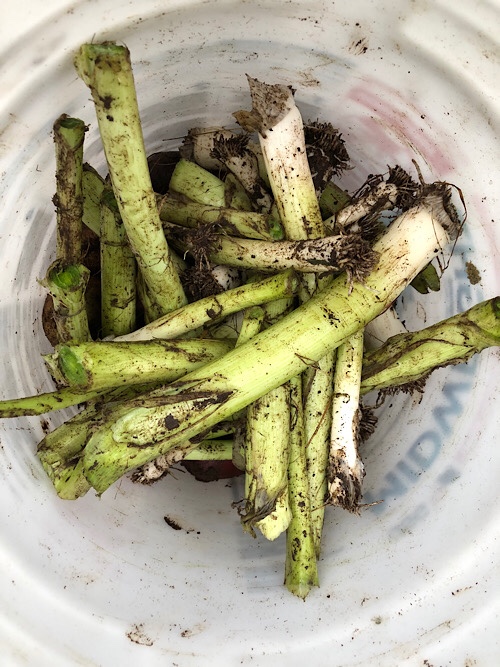
After a few days of below freezing temperatures, we can still get greens from the hoophouse! Seems amazing.
Spinach, arugula, escarole, kale. And some baby claytonia.
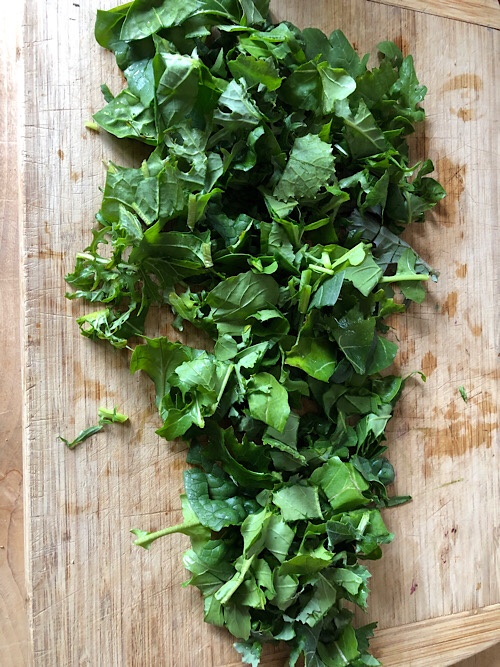
My new obsession. Recipe from Rowen White, indigenous woman and seedkeeper, who posted it on social media. I’ve made three batches now, fine-tuning each time. Here’s a few photos without going into the whole procedure.
Night before, feed my starter. I just store the scrapings from each time in my fridge, a technique I learned from Bake with Jack, UK, on YouTube. I love my starter. It’s so reliable.

Starter added to milled whole wheat flour.

Scrapings go back in the fridge for next time. Sometimes I wipe off the rim which can get gunky and very dried out. If things get too dirty looking, I transfer to a clean container, but not every time.

All ingredients: 3 cups flour, about 100 g of starter, one tablespoon honey, 1/2 tsp salt, 1 cup oat milk. I made two mistakes here: put the salt right on the starter (not it’s favorite substance) and added cold oatmilk (I really should warm it!). Nevertheless, everything proceeded just fine.

Initial dough ball is pretty dry and coarse. Let rest for 30-60 minutes. Then knead for five minutes. Then let rise for 8-12 hours.

After dough has risen, the texture is much softer and the sourdough action is apparent. Press down with fingertips to about 1″ in height. Then cut in rounds. I used a drinking glass.

Muffin rounds resting, cornmeal sprinkled above and below. The irregularly shaped ones are assembled from remnants of dough after cutting the nice rounds. Let these rise for awhile.

Cooling on a rack after cooking on the stovetop. I used a ceramic frying pan with lid. I cook three at a time for six minutes each side on a low flame. These look delicious.

It seemed to take me forever to acknowledge that winter is coming, is indeed here.
I declare that putting the garden to bed is finally finished.
Some things didn’t get done or are done haphazardly.
Potatoes, parsnips and carrots are still in the ground. Marked as well as possible, except for the carrots.
Some leeks are still in the garden. I had so many from the community garden that I couldn’t deal with that patch at home. Today I just threw some hay on their frozen stalks and decided to leave until spring.
Sam built a cold frame of sorts over the mature kale. We’ll see how that does.
I took away all the row cover. Note to self: row cover in the late garden is a bad idea. It freezes onto everything, blows around in storms, sags under any little snowfall, and generally gets beat up and ripped to shreds. Useless. I just laid hay, the magic blanket, on top of all the remaining greens.





It’s cold. After a warm November that lulled me into laziness. I didn’t get everything done in the garden. So some things froze that aren’t supposed to. Granted, I don’t really have the infrastructure needed to keep greens in the main garden. That would probably be cold frames. The row cover is not adequate. That’s the way it goes.




The dried heads of various flowers are interesting this time of year. A variety of browns and all different textures. I don’t cut them back until spring so they can provide cover or whatever for creatures that might depend on them.


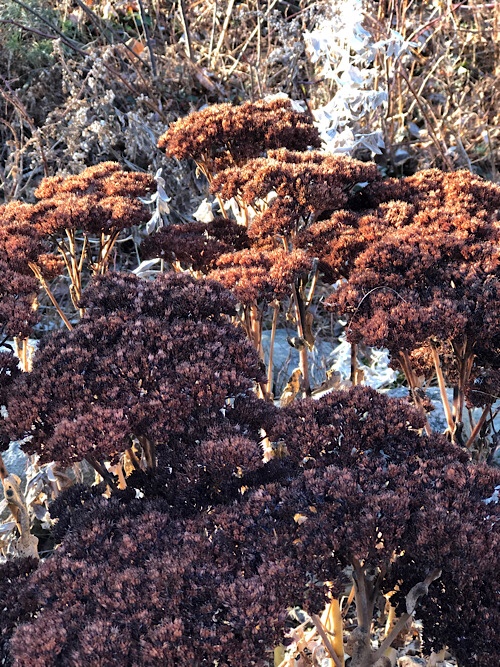
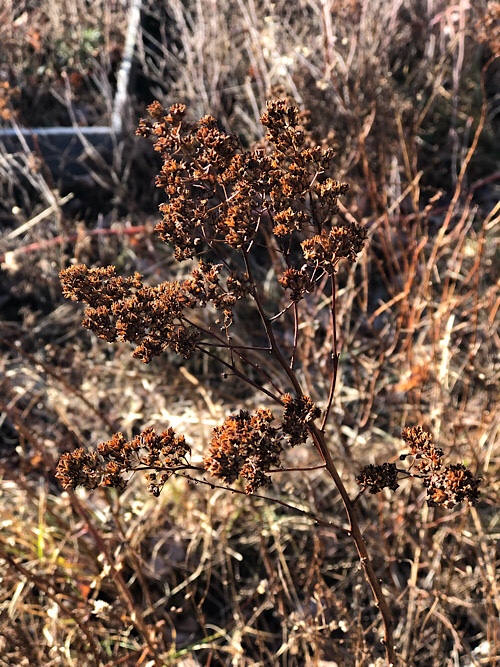

And I spotted these sweet little cups when cutting back fronds in the asparagus bed. They are growing on bits of straw. The largest is maybe 1/4 inch wide.

We had a wonderful relaxed get together at Tim and Jerry’s house. I didn’t take a lot of photos. I cooked a lot. As vegans, we tend to bring our own food so we can make sure of enough to eat.
I experimented with winter squash. I roasted both a pumpkin (“Winter Luxury”) and a buttercup squash. Then pureed them separately and together. Then performed a taste test.

The pumpkin easily pureed but was watery and had little flavor. The buttercup was sweet and delicious, but very dry and didn’t easily puree. There are major chunks in that bowl. The blend was just about right. The taste of the buttercup still came through, but the wet pumpkin really helped the texture. So our pies were a blend! And I brought the remaining mixture as a side dish, completely unadorned with spices or anything else.
My other big innovation this year: sage powder. I dried a few branches of sage in the house, then stripped off the leaves. Removed most of the stems. Then put it in the spice grinder. It came out delightfully fluffy. I don’t think it’s dry enough to jar yet, so I’m letting it sit out in this pan for awhile. Maybe it will lose some flavor…


In a marathon session, I harvested and cleaned six pounds of Brussels sprouts. My sprouts dreams came true this year. Four pounds blanched and frozen, one prepared for dinner, and one in the fridge.
It seemed to take forever. Next year, do this task one or two stalks at a time!
Some were rotten. Others were just partly rotten. Some bug damage but not nearly as bad as it could have been. All in all, a successful crop.



No after picture. Too eager to get the job done and get over to Paula’s for dinner to remember to photograph.